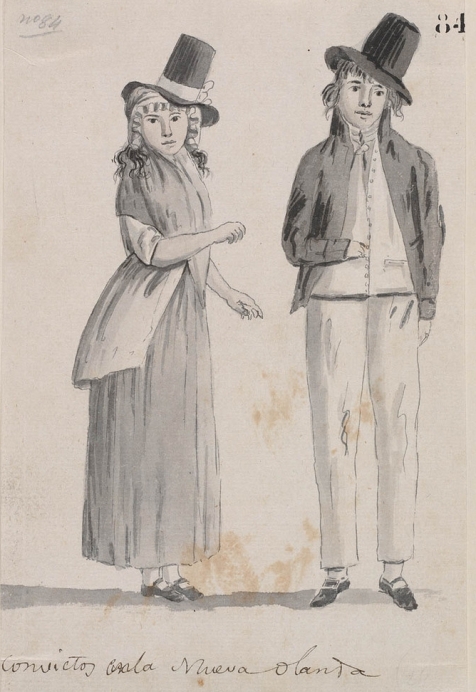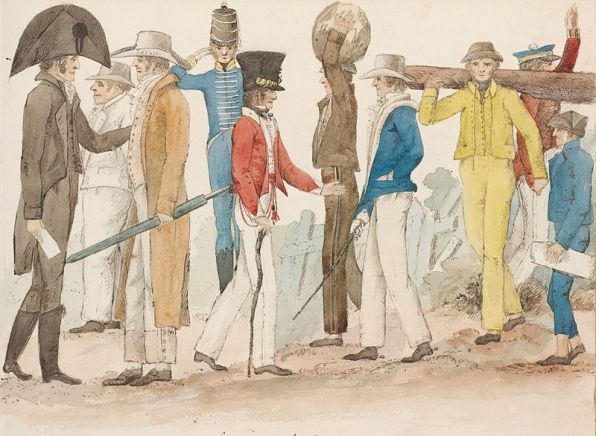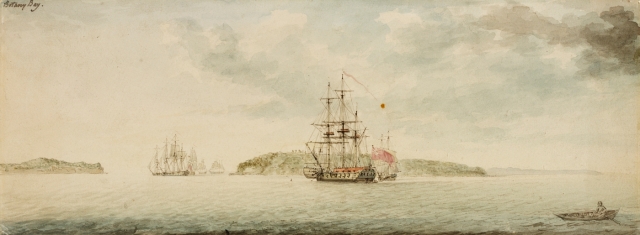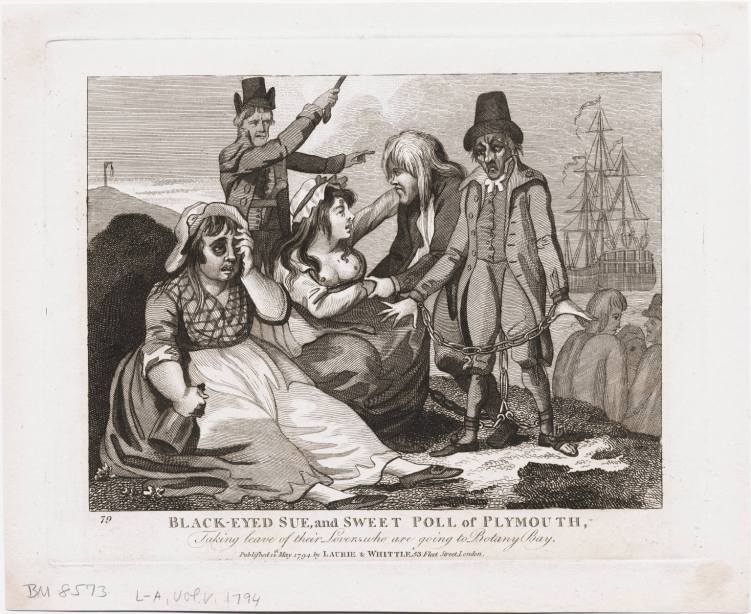
In light of the controversy surrounding the television programme ‘Banished‘ I decided to share this letter that I came across in the Chester Courant 13 November 1798.
It is a fascinating letter from a daughter to her father after she was transported to Botany Bay and gives an insight into life in Australia from a female perspective, and shows how incredibly astute she was in her determination to succeed as a businesswoman.
Sarah seems totally undaunted by the fact that she has been sent thousands of miles away from home without a man to support her. She may well have had someone, possibly an officer keeping a watchful eye over her and possibly writing her letter for her, but there is no indication of that in the letter.
Would she have had the same opportunity had she remained in England? possibly not. Draw your own conclusions from her letter. If she wrote the letter herself then it would imply that she was from a good family and reasonably well educated, which begs the question as to why she should have stolen.
The letter is simply signed SB . . .
“I take the first opportunity of informing you of my safe arrival in this remote quarter of the world, after a pretty good passage of six months. Since my arrival I have purchased a house, for which I gave 20 shillings and the following articles, three turkies at 15 shilling each, three sucking pigs at 10 shillings, a pair of pigeons at 8 shillings, a yard dog, also two Muscovy ducks at 10 shillings each, three English ducks at 5 shilling, a goat, five guineas, six geese at 15 shilling each.
I have got a large garden to the house and a licence. The sign is the ‘Three Jolly Settlers’. I have met with tolerable good success in the public line. I did a little trade in the passage in a number of small articles such as sugar, tea, tobacco, thread, snuff, needles and everything I could get anything by. The needles are a shilling a paper here and fine thread is sixpence a skein.
I have sold my petticoats at two guineas each and my long black cloak at ten guineas which shows that black silk sells well here; the edging that I gave 1 shilling and eight pence per yard in England I got 5 shillings for it here. I have sold all the worst of my cloaths as wearing apparel bring a good price.
I bought a roll of tobacco at Rio Janeiro at 54lb weight, which cost me 20 shillings which I was cheated out of: I could have got 12 shillings a pound for it here. I likewise bought a cwt of sugar there and also many other articles. Rum sells for 1 shilling and sixpence per gallon there, and here at times 2 shillings.
Any person coming from England with a few hundred pounds laid out at any of the ports that shipping touch at coming here are liable to make a fortune. Shoes that cost 4 or 5 shillings a pair in England, will bring from 10 to 15 shillings here.
On our passage here we buried only two women and two children; the climate is very healthful and likewise very fertile as there are two crops a year of almost everything; and I really believe with the assistance of god, by the time I have paid the forfeit, according to the laws of my country, I shall acquire a little money to return home with, which I have not the smallest doubt of, and to be a comfort to you at the latter end of your days.
Any person that should have a mind to come here as a settler, by applying at the Secretary of States office, may have free passage and likewise two men and a farm here, which is great encouragement.
I should be very glad to hear from you at the first opportunity. I live by myself, and did not do as the rest of the women did on the passage, which was, every one of them that could, had a husband. I shall conclude with giving my kind love to my brothers and sisters, nieces and nephews, so am dear father, your ever dutiful, loving and affectionate daughter, till death. SB

Okay, so I was hooked, a fascinating letter but who was SB . . . well, the answer was Sarah Bird.
She was the daughter of Thomas Bird and his wife Anne and was baptised on 24th April 1763 at Nutfield, Surrey and had at least 3 brothers and 3 sisters according to the baptism records.
I found a burial for one of her siblings, Amy who died in 1767; unfortunately, the writing on the gravestone is extremely badly worn away now, but both parents are named on the stone so obviously, Thomas and Anne were able to provide a stone for their daughter.

She was convicted of stealing a handkerchief at Middlesex and was sentenced on the 19th of July 1794 to transportation for 7 years. The court records described her as being aged 26, height 4 feet 6 inches, dark hair, grey eyes and according to the Oracle and Public Advertiser of 11th July 1794 her actual crime was that of stealing 4 handkerchiefs, a cotton curtain and a tablecloth, property of her employer William Bryan, an attorney of George Street, Westminster.
Sarah’s name appears on the record on the ship The Indispensable, on her maiden voyage as a convict ship carrying 133 female prisoners, under the command of Captain William Wilkinson. The ship left Portsmouth in November 1795.

We know from the ship’s route and from Sarah’s letter that it called at Rio de Janeiro for provisions en route and that the ship lost 2 prisoners during the journey.
On arriving, Sarah, as she states in her letter, set up her own business and was the first woman in New South Wales to hold a liquor licence. It appears that despite the predicament she found herself in she was determined to make a good life for herself whilst there but retained plans to return to her father and family in England.
However, it seems that this plan to return home after her 7 years sentence was over didn’t happen as she became involved with a most unpleasant man, John Morris:
In January convict John Morris stabbed the gaoler before escaping from the gaol, to run home and cut the throat of his partner, Sarah Bird, from ear to ear. He was quickly recaptured, Sarah Bird and the gaoler survived their injuries. However, in March, Morris was tried, found guilty of attempted murder, and sentenced to hang. On reviewing the evidence placed before the court, Foveaux requested that the Judge Advocate carry out another investigation, paying attention to the personal involvement of Captain Wilson in the abuse Morris received on the day of his recapture. It was confirmed that Wilson had ordered that Morris’ head be shaved; on the way to the triangle, Wilson had repeatedly beaten the prisoner with a metal tipped stick until his body was welted, before the flagellator was called upon to administer 100 lashes. After the flogging, Captain Wilson directed that salt water be thrown over the lacerated prisoner, and then commenced to beat him again with his stick until Morris was double ironed using hot rivets that burnt his skin.Foveaux declared that Morris had already received excessive corporal punishment and that the capital sentence was unwarranted. The trial verdict was therefore suspended pending further directions from England. Foveaux forwarded a copy of the evidence and advised Lord Hobart that as:. . . much doubt has arisen in my mind concerning the propriety of putting the sentence of the court into execution, and as I conceive several other unjustifiable modes of punishment were exercised on the person of this wretched man, by throwing salt water over his back after having been flogged, his having been beaten with a stick by Captain Wilson in person and subsequent thereto, and as an additional torture irons were fastened on him with hot rivets, by which the unhappy culprit’s legs were burned. I have therefore judged it most expedient to suspend the execution of the sentence and to submit the merits of the case to His Majesty.
An article in the Sydney Gazette of 1804 said that Sarah had been in her bed when Morris ran into the house they had shared and, with his knife, he had slashed her across her throat from ear to ear.
She tried to fight him off, receiving a wound in her left arm, extending downwards in an oblique direction across her wrist, cutting through sinew, all the while shrieking for help.
Prior to this event, which led to John being sentenced to 30 years hard labour, the couple produced two daughters, Sarah & Ann(1802 – 1842). Ann followed in her mother’s footsteps as a businesswoman and became a newspaper proprietor.
So, despite the letter home to her father, Sarah remained in Australia and established herself as a successful businesswoman until her death in Sydney, in 1842 aged 79 which ties in perfectly with the baptism we found for her.

Header image
A View of Sydney Cove, New South Wales, Yale Center for British Art, Paul Mellon Collection
Sources used:
Alcohol and Temperance in Modern History
The Trial of the Twenty One
Old Bailey online
New South Wales State Archives and Records
Ann Howe, Australian Dictionary of Biography
Ann Howe, Wikipedia

I was absolutely enthralled by this blog about Sarah and her Botany Bay experience as a convict! I had no idea you could take money, buy/sell goods and arrive ready and able to set up a ‘business’ and become so successful.
I was so pleased Sarah recovered from having her throat cut, but can’t help wondering if there was more to the story behind Captain Wilson’s appalling abuse of John Morris. Was Captain Wilson so inhumane to all the prisoners or was this ‘personal’?
So impressed with the research you have done, many congratulations!
This rates as one of my top ten 5* best blogs ever!
kind regards
LikeLike
Oh thank you so much, we’re thrilled you found it interesting. There probably was more to the story and hopefully we’ll be able to piece some more pieces of the jigsaw together, or perhaps one of our readers will be able to shed more light on Sarah’s life before she left for Australia and after her arrival. She was quite a woman!
LikeLike
Pingback: A new life in Australia for prisoner Sarah Bird (1763-1842) | All Things Georgian | First Night History
One of my own great-grandfathers came to Australia in the same manner: he was a small-time repeat offender who was transported to Van Diemen’s Land (Tasmania). Once there, he apparently decided to behave himself, because he had finished only half his sentence when he was granted “ticket of leave” ie parole, and finally early release. After that, he became a respectable citizen and married my great-grandmother, a woman who had been left a widow with small children just a couple of years after she had arrived in the country.
The British transportation program worked on a two-strikes-and-you-are-out system. Break the law in Britain, and you served time at home. Break it a second time, and you joined the great colonial empire-building scheme on an involuntary bassis. It was brutal, but fair. If you bucked the system you went down. If you behaved yourself, like my great-grandfather, you went up. In Shadow Over Tasmania, Coultman Smith (no relative) claimed that it was one of the world’s great criminal rehabilitation programs, taking professional criminals and those starting out on a life of crime, out of the slums and other baleful influences and over to a new land where they could start over again. Apparently the same applied to the earlier transportation to America, as Daniel Defoe recounted in Moll Flanders, published in 1725.
LikeLike
Thank you so much for reading our article and for taking the time to share with us the information about your ancestor, there are some amazing stories out there about people that were transported and it’s a topic that we’re highly likely to be returning to. 🙂
LikeLike
This was so interesting! I did some research on my family history and discovered that one of my very distant ancestors was also sent to Australia for stealing two geese. Seems a bit harsh, but something to tell my family nonetheless!
LikeLike
Thank you so much. There we many people sent to Australia for crimes that today we would regard as relatively trivial, in Sarah’s case it was great to see that she made a successful life for herself and her daughters.
LikeLiked by 1 person
Absolutely! Great post!
LikeLiked by 1 person
There is a bit of a myth here in Australia that most of the convicts were minor offenders. One person claimed his ancestor was transported for stealing a length of rope, forgetting the large horse attached to the other end. It is true that punishments were very harsh in those days. It is also true that many of the charges were deliberately downgraded to below the death penalty threshold. Also, for most of them, it was their second offense. In other words, this was what the authorities got them on, just as Al Capone was sentenced for tax evasion. When one official went around the convicts enquiring about their occupations, many gave their occupation as “thief”. “In that case,” he replied, “we’ll put you down as a labourer.”
LikeLiked by 1 person
Yes, l have a female ancestor, one person crime wave,……. taught her 2 children in the ways of crime….engaged boys to do her criminal bidding. Continued her deviant ways out in VDL and so did her two children.
LikeLike
She sounds like a fascinating character … do tell more 🙂
LikeLike
What a wonderful story, thanks for sharing it with us.
LikeLike
Our pleasure, so pleased it was of interest 🙂
LikeLike
Pingback: History A'la Carte 8-27-15 - Random Bits of Fascination